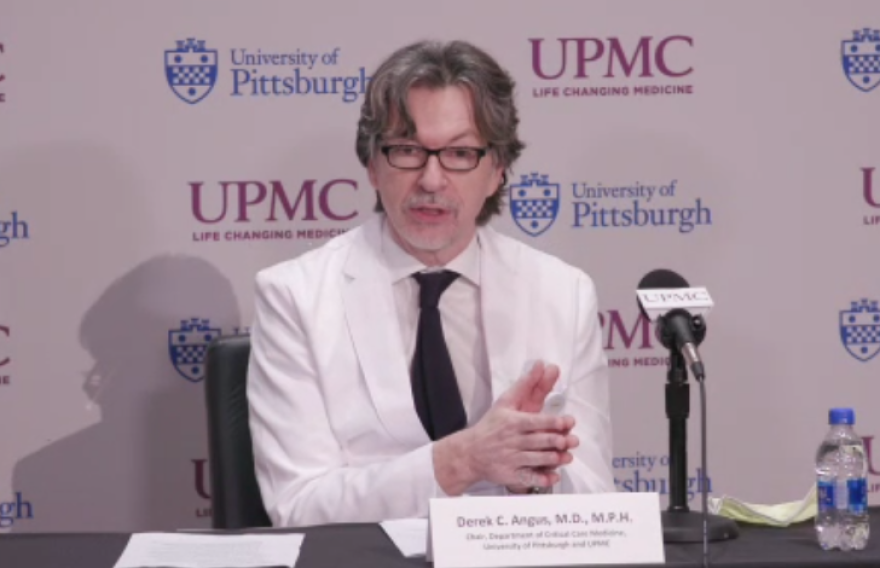There is no shortage of potential treatments for the coronavirus—the real shortage is the time to figure out which ones work best. But UPMC says it plans to use artificial intelligence to accelerate the timetable for winnowing out approaches that don’t work. And among the first drugs to be tested will be anti-malarial medication hydroxychloroquine, which President Donald Trump has touted in press conferences.
"Already there are hundreds of clinical trials that have been registered around the world," said Dr. Derek Angus, professor and chair of the Pitt’s Department of Critical Care Medicine. But given the coronavirus threat and the years it can take for conventional clinical testing to be complete, "We do not have the luxury of time. We must try to learn while doing.”
Researchers call the approach REMAP, for Randomized, Embedded, Multi-factorial, Adaptive Platform. Angus and others devised a half-decade ago, and it allows researchers to pursue a number of potential treatments at the same time, using fewer patients than standalone clinical trials. The treatments are tested side-by-side, with the AI directing more patients to those that show the most promise, though a process called “reinforcement learning.”
In a Thursday-morning press conference, Angus said the result is that "even while the trial is still running, the trial then changes the odds towards getting those treatments more frequently. So the poor-performing therapies are discarded quickly, and essentially our physicians are always betting on the winning horse. The trial ends faster [and] the best treatments are given to the most patients right out of the gate.”
UPMC says it will join its research – which it is billing as the UPMC-REMAP-COVID19 trial – to similar efforts elsewhere in North America, Europe, and Australia and New Zealand. The effort is backed by governments and other institutions, as well as UPMC Enterprises, which provides venture capital to health care entrepreneurs.
For its part, UPMC plans to use the approach across its 40 hospitals, starting with several proposed coronavirus treatments – including steroids and hydroxychloroquine. Drugs can be tried in various dosages and combinations – a process which UPMC likens to a chef comparing how diners respond to various meals. New drugs that come online can be added to the test as time goes on.
Asked about hydroxychloroquine, which Trump has touted repeatedly, Angus said it had potential, but said his feeling was "The correct answer is probably going to be a combination of therapies that we haven’t even tried yet.”
Without testing, he said, "People have ideas, they try to treat people, but they can’t work out if it actually makes a difference."
Even with the expedited approach, Angus said it would take time to figure out which therapies were successful.
“To completely know an answer with a high degree of certainty can still take weeks or months depending on how rapidly patients are enrolled," he said. But because of the learn-by-doing approach, the "therapy that is most likely to be doing well is already … steered most often towards patients.”
UPMC boasts that its research will be augmented by its electronic-health record system – a platform that Angus says helps build a “one-stop shop” that allows any patient to join the trial.
Using artificial intelligence in medical testing is not a new idea. The randomized control trials which have been the baseline research tool for decades, are time-consuming, and have only a 10 percent success rate at producing an approved medication. But the coronavirus — for which there is no immunity, no treatment, and no vaccine — has given new impetus to the drive to find a faster approch.
That is true even in Pittsburgh, where UPMC emergency medicine chair Donald Yealy spoke at the press conference to offer a fairly sunny outlook for the region—one that went beyond the more tempered statements from public officials. "It looks like we've flattened the curve" when it comes to a rise in new coronavirus cases, he said. "We're not seeing the spikes or the surges that we're seeing in other parts of the country."
When asked Wednesday whether Allegheny County had seen a flattened curve, Allegheny County Executive Rich Fitzgerald said it was too early to make that determination. “I don’t know that we have enough data yet, or enough days of testing and enough testing to say we’re there,” he said. “We’re cautiously optimistic that we’re seeing some positive results.” Health Department Director Dr. Debra Bogen concurred.
UPMC, Yealy said, was treating "without difficulty" 97 COVID-19 patients across its system, with 53 in southwestern Pennsylvania. "Our hospitals have ... plenty of capacity should we need to take care of more patients. We have an ample supply of masks, gloves, gowns and respirators to do this safely."
Still, Yealy said that social distancing efforts should continue, though he envisioned a time when they would "evolve" if cases stayed low.
*This story was updated at 12:46 p.m. on April 9, 2020 to include additional information from a press conference.





